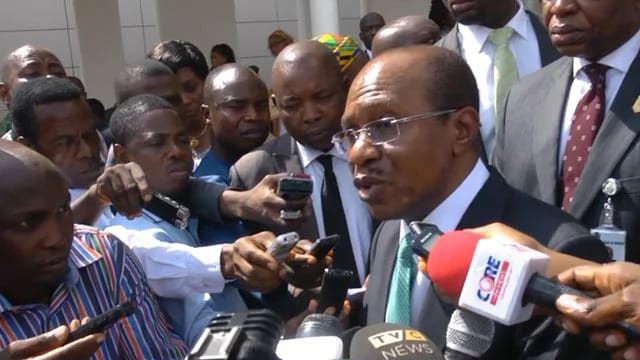TVC E. The Governor of the Central Bank of Nigeria (CBN), Mr Godwin Emefiele, has promised to review some aspects of the bank’s flexible exchange rate policy to allow more manufacturers and other end users more access to foreign exchange, after nearly two years of embargo on importers of 41.
Emefiele, who spoke in Washington DC, USA, after crucial sessions with foreign investors and other stakeholders including the International Monetary Fund (IMF), and the World Bank Group, noted that though the flexible exchange rate policy was commended by several stakeholders at the meetings, there may be need still to review some aspects of it in the months ahead, to boost job creation and manufacturing capacity. The policy change option was coming amidst huge job and capacity losses in the manufacturing and other critical sectors of the economy since its introduction on June 23, 2015.
“We heard the IMF Managing Director Christine Lagarde, saying there is need to consider further liberalisation of the Naira, but like I have always said, the flexible exchange rate regime document that we have in place is a very sound document and truly speaking, I have not seen one person that has criticised it. But what we only have to talk about is fine-tuning few aspects of it, in terms of the implementation of the content of that document. That is why I said we would from time to time, continue to look at it. As we are looking at it, I repeat, we would see how we would continue to fine tune it, to the extent that whatever we are putting in place would be such that would benefit Nigerians, and improve their lives as well as the country.” He said
The CBN boss added that it was important for Nigerians to underscore the significance of the various meetings the country’s delegation had with stakeholders from about 189 countries that added the World Bank Group meetings on the country’s economic outlooks and where it was heading to vis -a -vis, what is likely to be seen in the immediate, short term and the long run for the global economy.
He explained “We held meetings with some groups of foreign investors who have shown interest in coming into Nigeria, but that they had few issues with some of our policies which they want us to address. They liked the fact that we adopted the flexible exchange rate regime, but there are some areas they want us to change, and like I always say, these policies are not cast on stones. We can always go back and look at them but what is most important in our mind as we are trying to look into these policies is that we will make sure that they are policies that have been done in the interest of Nigeria and Nigerians. What is important at this stage is how do we protect Nigerians. We are committed to ensuring that we reduce the level of unemployment and what we can do to ensure that manufacturers continue to improve their industrial capacities, as well as how to make it possible for them to get foreign exchange to run their factory.”
According to the CBN boss, global growth remains subdued at 3.1 per cent for 2016 in line with forecast and thinking that in 2017, it would hopefully grow to about 3.4 per cent.
But, unfortunately, from the African side, Emefiele, said growth was downgraded to about 1.4 per cent from about 3.6 per cent forecast at the pervious meeting in Washington.
He explained that the drag primarily came from big countries in Africa, particularly Nigeria, South Africa and Angola which incidentally are all commodity exporting nations, and so because of the adverse impact of the commodity prices, they had what can be called significant drag on the growth on Africa.
On why Nigeria must ginger its productive sector, the governor noted that the non -oil and non -commodity producers which defended their economies have continued to witness good growth.
He said “What that means as we talked to our colleagues is that there is need for us to continue to put in place policies that will diversify and reduce dependence on commodities as sources of livelihood into other areas that are non -commodities dependent. There is also strong need for Nigeria and other primary commodities economies to look at structural reforms and that as part of the things that the minister has address quite succinctly about infrastructure, power, roads and some of the projects that have been stalled over period of time.”
Emefiele further stated that “A key lessons from the meetings was that for the emerging markets and developing countries, there is no one solution that fits all which also underscores the need for all go back and think of what kind of policies that we think can be put in place to help our economies”.
He said the Nigerian team also held meetings on the sidelines with delegations from central banks from different countries to see how the CBN can also collaborate with them on the bilateral currencies transactions raising optimism that this will yield some result.


















